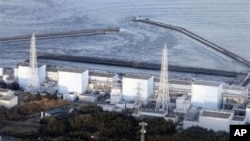The International Atomic Energy Agency says it does not expect radiation levels at Japan's earthquake and tsunami-battered Fukushima nuclear power plant to increase much between now and the time when the nuclear crisis is brought under control.
IAEA Nuclear Safety Chief Denis Flory told reporters Tuesday in Vienna that radioactive material is still leaking "at a low level" but that the leaks are decreasing and will likely continue to do so.
Flory spoke in Vienna hours after Japanese workers began pumping highly radioactive water from one of the plant's badly damaged reactors, beginning an essential first step before the plant's vital cooling systems can be repaired.
Tokyo Electric Power Company officials said 10,000 tons of water will be removed from the plant's number two reactor building over the next three to four weeks. An estimated 25,000 tons of radioactive water have accumulated in the basement of the plant's turbine building and an adjacent tunnel, making it impossible for technicians to proceed with repairs.
|
VOA Asia Extra: From a scientific perspective, Japanese-American physicist Michio Kaku of City University of New York believes nuclear power specialists in Japan were not prepared for what happened March 11 when an earthquake and tsunami crippled the Fukushima plant. He tells VOA's Steve Norman they were not expecting an event that comes along only once in 100 years. |
Similar amounts of water have collected at the number one and three reactors. Japan's nuclear safety agency confirmed for the first time Monday that fuel rods have melted down at all three units, though it could not say to what extent.
Experts say the level of radioactive release at the Fukushima plant is currently about 10 percent of the amount released 25 years ago in the nuclear disaster at Chernobyl.
Chief Cabinet Secretary Yukio Edano said at a press conference Tuesday morning that a total meltdown is not likely as long as temperatures continue to drop at the reactors.
Edano also urged theJapanese people to be more accepting of the tens of thousands of people who have been evacuated from areas around the plant. He said there are reports that a city in Ibaragi prefecture is asking the evacuees to submit to radiation tests, and noted that exposure to radiation is not infectious.
Some information for this report was provided by AP and Reuters.




